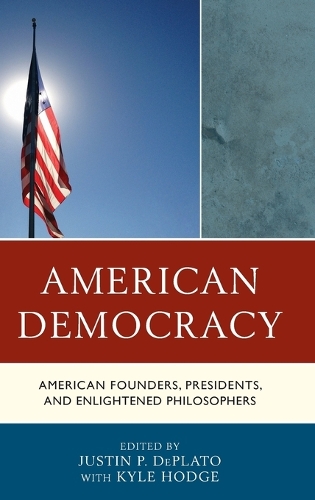
American Democracy: American Founders, Presidents, and Enlightened Philosophers
(Hardback)
Available Formats
Publishing Details
American Democracy: American Founders, Presidents, and Enlightened Philosophers
By (Author) Justin P. DePlato
With Kyle Hodge
Bloomsbury Publishing PLC
Lexington Books
8th October 2015
United States
Classifications
Professional and Scholarly
Non Fiction
Political science and theory
Political structures / systems: democracy
320.973
Physical Properties
Hardback
666
Width 162mm, Height 235mm, Spine 42mm
1021g
Description
Following the Renaissance, democracy was still considered a dangerous form of government. Democracy was often regarded as a fools folly and a madmans paradise. The well-wishers of the Republican Government would have fanciful debates in intellectual circles, but paternal monarchies dominated the western and eastern world. Yet in a heroic and herculean way, a group of Anglo-Saxons, who grew up under proud monarchies, rose to dethrone the English Crown and to establish the greatest democracy in history. What theories inspired these men Why didnt they just simply create an American King Or better yet, make themselves kings The answers to these questions lie in the eloquent and exact writings of great American Founders, Presidents, and Enlightened Philosophers such as: James Madison, George Clinton, Edmund Randolph, Thomas Paine, Thomas Jefferson, George Washington, Patrick Henry, John Adams, Alexander Hamilton, Benjamin Rush, John Hancock, John Jay, Cicero, Aristotle, John Locke, Hugo Grotius, John Winthrop, Franklin Roosevelt, Abraham Lincoln, William McKinley, Ronald Reagan and more. Unlike other rulers, American rulers are bound to the law. There is no doubt that the Founding of America is an event of unparalleled greatness. This book allows the reader to share in the dreams and thoughts of these great men, in their own words, and allows the reader to draw informed conclusions that they surmise from reading the primary documents.
Reviews
DePlato and Hodges reader on the philosophical origins of American democracy is a welcome addition to the literature. It will be a valuable companion to monographs on American political philosophy and politics. The book includes a thematic analysis of, as well as excerpts from, philosophers and the American founders writers such as the Ancient Greeks, Plato and Aristotle, Roman scribes such as Cicero, the contract theorists such as Hobbes, Locke, and Rousseau, and the Founders of the newly independent American Democratic project such as Washington, Paine, Franklin, Gerry, Jefferson, and John Adams, plus 14 American presidents from Washington to Reagan. This means that readers will be forced to interpret the significance of each historical figure to the founding of the country. The book raises the provocative question: if modern-day Americans knew nothing about the foundational principles of the country, does it matter The answer clearly leads to the affirmative. For example, how do we explain the fact that in the aftermath of the American Revolution, English Colonials in America choose democracy instead of copying the British Empire that gave birth to the colony In other words, the book convincingly shows any serious reader that the American democracy was truly an exceptional historical event. -- Ronald T. Libby, University of North Florida
It would be hard to fault the selections of Grotius, Hobbes, Locke, Montequieu, and Rosseau. The editors' comments and linkages to the historical context are well done.... The American Project section is sound and the primary source selections judiciously chosen.... In sum, DePlato and Hodge offer a sourcebook that instructors may adapt to a variety of intellectual perspectives... [T]hey provide ample opportunity for instructors and students to engage in a dialogue over the intellectual influences on the American Founding and its application by subsequent statesmen. * Journal Of Interdisciplinary Studies *
History has shown that many governments operate as a practical matter, exerting power and legitimizing themselves according to one or another schema. Governments enacted according to philosophical principles have more often than not proven ineffectual (i.e. the great socialist states of the previous few decades). One nationthe United States of Americahas survived as a practical power, coming to dominate the international scene in recent history, but rests on philosophical principles. American Democracy reveals the philosophical traditions that support the American republic and provides historical clues as to why it may continue to do soin some formfor a long time to come. -- Carl Colavito, Florida State College at Jacksonville
Author Bio
Justin P. DePlato is assistant professor of political science at Robert Morris University. Kyle Hodge is a graduate student of philosophy at the University of Florida.
